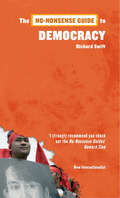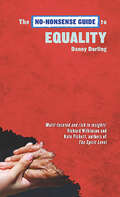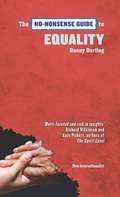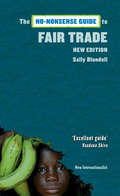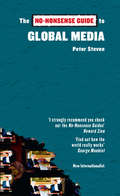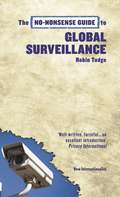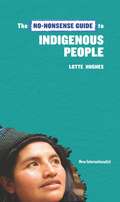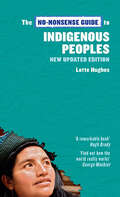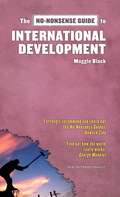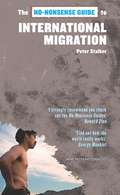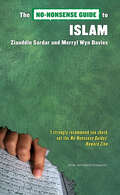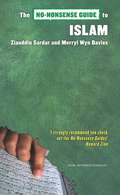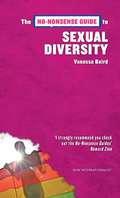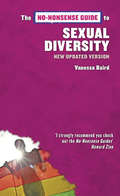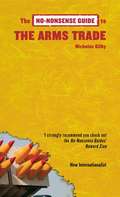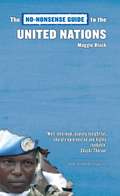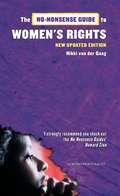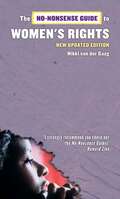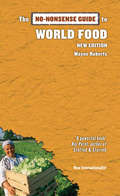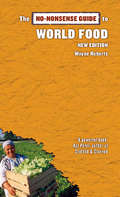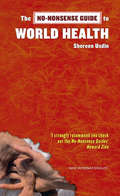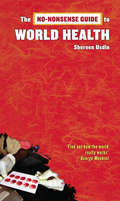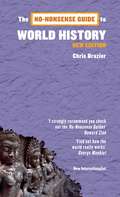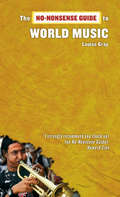- Table View
- List View
The No-Nonsense Guide to Democracy
by Richard SwiftFollowing the economic meltdown and the triumph of Barack Obama, have the chances of genuine democracy improved?In this updated edition of The No-Nonsense Guide to Democracy, Richard Swift explores how democracy has been constricted and deformed by economic power brokers and a self-serving political class from Birmingham to Bangalore. He considers the different tools people in power have used to manipulate democratic principles, such as freedom, to their advantage.The book includes chapter-length discussions of topics such as the economic meltdown, Barack Obama, eco-democracy, democratizing the economy, and democracy in the global south. It is also a guide to the rich diversity of forms of elected government, and it contains practical ideas for empowering today's voters around the world.Richard Swift was co-editor for the New Internationalist magazine from 1984 to 2007 and lives in Toronto. He has written and broadcast on questions of ecology and democracy for many years.
No-Nonsense Guide to Equality (No-Nonsense Guides #6)
by Danny DorlingA wide-ranging exploration of why inequality persists and what can be done about it, the No-Nonsense Guide to Equality discusses the positive effects that equality can have, using examples and case studies from across the globe. It examines the lessons of history and covers race, gender and ethnicity, age, and wealth. Danny Dorling considers, realistically, just how equal it is possible to be, the challenges we face, and the factors that will lead to greater equality for all.
No-Nonsense Guide to Equality (No-Nonsense Guides #6)
by Danny DorlingA wide-ranging exploration of why inequality persists and what can be done about it, the No-Nonsense Guide to Equality discusses the positive effects that equality can have, using examples and case studies from across the globe. It examines the lessons of history and covers race, gender and ethnicity, age, and wealth. Danny Dorling considers, realistically, just how equal it is possible to be, the challenges we face, and the factors that will lead to greater equality for all.
The No-Nonsense Guide to Equality
by Danny Dorling Richard Wilkinson Kate PickettThe No-Nonsense Guide to Equality discusses the positive effects that equality can have, using examples and case studies from across the globe, including many from the United States. It examines the lessons of history and covers race, gender and ethnicity, age, and wealth. Danny Dorling considers, realistically, just how equal it is possible to be, the challenges we face, and the factors that will lead to greater equality for all.Danny Dorling is professor of human geography at the University of Sheffield, United Kingdom, and one of the leading international experts on inequality. He has written extensively about the widening gap between rich and poor and his work regularly appears in the Guardian. He is author of several books, including Injustice: Why Social Inequality Persists and The Atlas of the Real World.
The No-Nonsense Guide to Fair Trade
by Sally BlundellAn in-depth look at two decades of a movement that aims to challenge the ethical foundations of the global market.Transnational corporations look for the cheapest suppliers, while the fair trade movement insists on a premium for the producers at the start of the chain.Sally Blundell uncovers the origins of fair trade and what it is likely to become.
The No-Nonsense Guide to Global Media
by Peter StevenPeter Steven explores the diversity of world media, from the corporate to the independent. He introduces readers to the political economy of the major media outlets, looking at the concentration of ownership and the convergence of technologies and media functions. In doing so, he encourages us to question how the media reflects society: are we passive recipients, or do we have a part in constructing the world?Peter Steven is a freelance writer based in Toronto, Canada. He has been a film columnist for New Internationalist and The Beaver magazines, and associate editor of Jump Cut magazine.
The No-Nonsense Guide to Global Surveillance
by Robin TudgeSpying, once the province of the KGB, CIA and MI5, has become part of everyday life. Governments routinely trawl our emails, CCTV cameras follow us on every street, while state databases of our DNA become larger all the time. This book shows the extent to which Big Brother is watching us all.
The No-Nonsense Guide to Indigenous People
by Lotte HughesThis guide looks beyond the exotic images tracing the story of different indigenous people from their first contact with explorers and colonizers to the present day. Much of this story is told by the indigenous people themselves and they present the issues behind the challenge to give them their own space in their own lands.
No-Nonsense Guide to Indigenous Peoples, Second Edition (No-Nonsense Guides #16)
by Lotte HughesSince the first edition of the No-Nonsense Guide to Indigenous Peoples was published in 2003, much has changed. The United Nations General Assembly has adopted the UN Declaration on the Rights of Indigenous Peoples. Indigenous rights have become an increasingly important subject in international law, with Bolivia’s first indigenous president, Evo Morales, arguing on the international stage from an indigenous perspective, and introducing policies benefiting indigenous communities through land reforms and redistribution of wealth. Moreover, there has been a surge in indigenous activism and advocacy, with the growth of a global indigenous rights industry, the effects of which are not always positive. This updated edition reflects the changing context and examines the developments as well as the tensions and contradictions, and includes as many direct voices as possible.
The No-Nonsense Guide to International Development
by Maggie Black"Overseas aid" and "international development" are catch-all terms that cover a multitude of activities--and abuses. This guide explains what "development" actually is--and explores its political and economic roots. It shows what can happen in the name of development and argues for a more organic, social approach with those it seeks to serve as equal partners in the process. Maggie Black has written books for the Oxford University Press, UNICEF, and Oxfam. She has worked as a consultant for UNICEF, Anti-Slavery International, and WaterAid, among others, and has written for the Guardian, The Economist, and BBC World Service.
The No-Nonsense Guide to International Migration
by Peter StalkerVirtually any commodity can move around the world to satisfy demand, but human beings have far less freedom. Many would-be migrants are forced to risk life and limb traveling illegally. Yet most rich countries are short of workers, have shrinking populations, and need more immigrants. This is a timely guide to a major issue that is never far from the political headlines.Peter Stalker is a former co-editor of the New Internationalist who now works as a consultant to a number of UN agencies. He has written two books on migration for the International Labor Organization.
No-Nonsense Guide to Islam (No-Nonsense Guides #19)
by Merryl Wyn Davies Zia SardarEven before September 11, 2001, Muslims were often framed by Western media and many non-Muslims as enemies of “freedom” and “progress.” Like other religions, Islam is not without its ongoing tensions and struggles. However, like other religions, there is a depth and richness to the Islamic faith that is too often overlooked because of stereotypes. This No-Nonsense Guide looks at the complexities of Islam and how its adherents are reconciling their faith with the social realities of the twenty-first century. In so doing, Merryl Wyn Davies and Zia Sardar examine the Qur’an and Islamic law (sharia), how world history has been shaped by Islam, Islam’s rocky relationship with the Western world, and the many challenges within and without Islam.
The No-Nonsense Guide to Islam
by Ziauddin Sardar Merryl Wyn DaviesThis guide explains Islamic history, the Qur'an, sharia law, and Islam's relationship with the West. It analyzes the struggle within the faith for a more humane interpretation of the religion, issues surrounding women, democracy, and economic development, and the outlook post-9/11 and the Iraq war. Merryl Wyn Davies is a writer, anthropologist, and TV producer. The author of Knowing One Another: Shaping an Islamic Anthropology, she also co-authored the international bestseller Why Do People Hate America? Ziauddin Sardar is a writer, broadcaster, and cultural critic. His works include Postmodernism and the Other, Orientalism, and Why Do People Hate America?, written with Merryl Wyn Davies.
The No-Nonsense Guide to Sexual Diversity
by Vanessa BairdThe treatment of sexual minorities--whether lesbian, gay, bisexual, or transgender--varies significantly in different parts of the world. In some countries, equal rights have been achieved and progress is being made against discrimination; in others, being gay still incurs the death penalty.This guide examines all the colors of the sexual rainbow, unearths hidden histories, and looks at contributions from medicine and science. It also includes a unique global survey of laws that affect sexual minorities. Vanessa Baird has been co-editor at New Internationalist magazine since 1986. Her previous books include, as compiler and editor, Eye to Eye Women.
No-Nonsense Guide to Sexual Diversity, 2nd edition (No-Nonsense Guides #22)
by Vanessa BairdThe world is changing and especially so for lesbians, gays, and people who are bisexual and transgendered. In some countries, hard-won battles for equality are bearing fruit in non-discrimination legislation. In others, being gay incurs the death penalty. This No-Nonsense Guide gives an overview of sexual diversity and reveals the hidden histories of LGBTI individuals, cross-dressers, and eunuchs across the world. It traces the strange search for the scientific “source” of homosexuality, the history of homophobia, and the role that religion and politics have played in controlling sexualities. Also included is a country-by-country global survey of the laws that affect sexual minorities.
No-Nonsense Guide to the Arms Trade
by Nicholas GilbyOne of the few up-to-date works on the whole of the arms trade, this book puts the global trade in weapons in the context of history and includes recent controversial deals, as well as case studies on Saudi Arabia, Iraq, and Darfur. It exposes the cynicism, bribery, and insider deals that characterize the conventional trade and the hidden world of torture.Nicholas Gilby led the Campaign Against Arms Trade (CAAT) in its efforts to expose the corruption at the heart of Britain's arms deals with Saudi Arabia over the past four decades. In 2008, he forced the disclosure of many documents concerning corruption in Britain's arms deals with Saudi Arabia.
The No-Nonsense Guide to the United Nations
by Maggie BlackIn the first book to distill the entire history of the United Nations into one accessible volume, Maggie Black explains how this complex organization works and explores its successes, failings, and current limitations. The book includes the creation of the UN and its early history, how it is structured, and whether it is well constituted in its functions. Black also considers possibilities for reform to make it more democratic, effective, and fit for its purpose.Maggie Black has written books for Oxford University Press, UNICEF, and Oxfam and articles for The Economist and BBC World Service. She has worked as a consultant for UNICEF and Anti-Slavery International.
The No-Nonsense Guide to Women's Rights
by Nikki van der GaagHas the battle for women's rights been won? Not when women still make up 70 percent of the world's poor. This guide examines the advances that have been made and looks beneath the surface to find out what the reality is for women all around the world.<P><P> It shows how, in this "post-feminist" age, women's rights are still very much an issue.Nikki van der Gaag is a freelance writer, editor, and evaluator on development issues. Prior to this, she was editorial director at the Panos Institute and co-editor of the New Internationalist magazine.
No-Nonsense Guide to Women’s Rights, 2nd edition (No-Nonsense Guides #27)
by Nikki van der GaagHas the battle for women'’s rights been won? As Niki van der Gaag points out, “it is easy to forget just how recently so many women’s rights have been won; and how many women still face violations of their rights on a daily basis.” In this No-Nonsense Guide, van der Gaag offers a status report on the women of the world by examining issues like health, poverty, politics, law, education, the environment, violence, and sexuality. And although we are not yet living in a “post-feminist” world and change is slow in coming, it is coming.
The No-Nonsense Guide to World Food: New Edition
by Wayne RobertsWayne Roberts puts under the microscope a global food system that is under strain from climate change and from economic disaster.<P><P>He shows how a world food system based on supermarkets and agribusiness corporations is unsustainable and looks at new models of producing healthy food from all over the world.
No-Nonsense Guide to World Food, 2nd Edition (No-Nonsense Guides #28)
by Wayne RobertsIn this updated edition of The No-Nonsense Guide to World Food Wayne Roberts puts under the microscope a global food system that is under strain from climate change and from economic disaster. He shows how a world food system based on supermarkets and agribusiness corporations is unsustainable and looks at new models of producing healthy food from all over the world.
No-Nonsense Guide to World Health (No-Nonsense Guides #29)
by Shereen UsdinHere is a clear, wide-ranging introduction to the worldwide state of human health. Starting with a brief history of modern medical progress, Shereen Usdin then untangles the knot created by poverty and globalization to show that where you live, how wealthy you are, and your gender all have a bearing on the diseases you may encounter in your lifetime—and your prospects for prevention, treatment, and ultimately, survival. Pulling no punches, Usdin also blows the whistle on the political economy of illness and how keeping people sick means more money for the pharmaceutical, tobacco, and food industries. This No-Nonsense Guide is a must-read for anyone who wants a clear sense of how healthy our global family really is.
The No-Nonsense Guide to World Health
by Shereen UsdinA clear yet wide-ranging introduction to the state of health worldwide, exploring the ways in which health provision is often determined by ethnicity, class, and gender. Starting with a brief history of medical progress, this guide delves into current politics of health in the contexts of big business and private health provision, media, gender, and the environment. Shereen Usdin is a medical doctor and a public health specialist. She is co-founder of the internationally acclaimed Soul City for Health and Development Communication in South Africa and works in the areas of development communication, HIV/AIDS, violence against women, and human rights.
The No-Nonsense Guide to World History
by Chris BrazierMost people's knowledge of world history is hazy and incomplete at best. This updated No-Nonsense Guide gives a full picture, revealing the hidden histories and communities left out of conventional history books--from the civilizations of Africa, Asia, and Latin America to the history of women. The new final chapter includes material on the financial crisis and the world response to climate change. Chris Brazier is co-editor at New Internationalist. His previous books include Vietnam: The Price of Peace. He is principal writer for UNICEF's The State of the World's Children report.
No-Nonsense Guide to World Music (No-Nonsense Guides #31)
by Louise Gray“World music” is an awkward phrase. Used to describe the hugely multifaceted nature of a range of, typically, non-English language popular musics from the world over, it’s a tag that throws up as many problems as it does solutions. Louise Gray’s No-Nonsense Guide to World Music attempts to go behind the phrase to explore the reasons for the contemporary interest in world music: who listens to it and why? Through chapters that focus on specific areas of music, such as rembetika, fado, trance music and new folk, it explores the genres that have emerged from marginalized communities, music from conflict zones, and music as a form of escapism.
